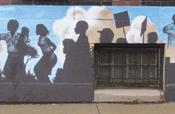The Black I Am In
Does the color of your skin really make a difference in how you are educated or how you are perceived once you are out of school? If an average black man or woman applied to a college to complete a degree in biochemistry, they are questioned about everything down to the color of their underwear. Has society changed since desegregation or has it just been masked? What does it take to get the entire community to accept one another as an individual rather than the color I am in?
Until the Civil Rights Movement was passed in 19781, minorities could not apply for a college if all 10 available seats were already occupied with other minorities; often, they were turned away to look for other options or forget the thought all together. Minorities were "tokens" for pawning into colleges and employment.
"For many years, colleges depended on a 1978 Supreme Court ruling to justify their affirmative-action programs.
That ruling, in the case of Regents of the University of California v. Bakke, stated that colleges could use race and ethnicity as a factor in admissions decisions but could not designate set numbers of spaces for members of specific ethnic and racial groups." 2
But has that really changed? "To be or not to be" is not the question, "Hadn't he heard the white folks?" (Angelo, 110). The answer for most minorities will always be "not to be", with the harsh looks and comments that today's minorities have to face daily; even if they are promising doctors, acceptable lawyers, or even exceptional teachers, they are never completely accepted because of the color they are in.
"We were maids and farmers, handymen and washerwomen, and anything higher that we aspired to was farcical and presumptuous," (Angelo, 109),
![[Castle and bridge of St. Angelo, Rome, Italy] (LOC)](https://s.writework.com/uploads/13/137115/castle-and-bridge-st-angelo-rome-italy-loc-thumb.jpg)

